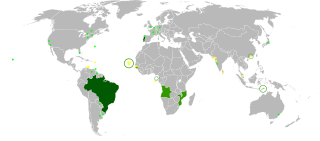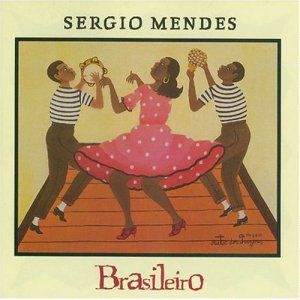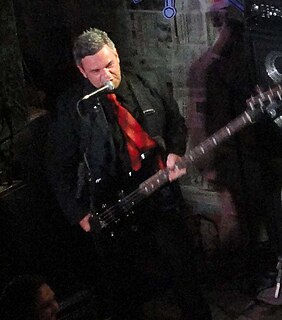This article needs additional citations for verification .(May 2019) (Learn how and when to remove this template message) |
| Noite Vem, Noite Vai | ||||
|---|---|---|---|---|
 | ||||
| Studio album by | ||||
| Released | 1991 | |||
| Genre | ||||
| Label | RCA Records | |||
| Producer | Reinaldo B. Brito | |||
| TNT chronology | ||||
| ||||
Noite Vem, Noite Vai (Portuguese for "Night Comes, Night Goes") is the third studio album by the Brazilian rock band TNT, released in 1991 through RCA Records. It was the band's final album to come out through RCA, their final release prior to their break-up three years later, their first one without original drummer Felipe Jotz (who was replaced by Paulo Arcari) and their only one with keyboardist João Maldonado.

Portuguese is a Western Romance language originating in the Iberian Peninsula. It is the sole official language of Portugal, Brazil, Cape Verde, Guinea-Bissau, Mozambique, Angola, and São Tomé and Príncipe. It also has co-official language status in East Timor, Equatorial Guinea and Macau in China. As the result of expansion during colonial times, a cultural presence of Portuguese and Portuguese creole speakers are also found in Goa, Daman and Diu in India; in Batticaloa on the east coast of Sri Lanka; in the Indonesian island of Flores; in the Malacca state of Malaysia; and the ABC islands in the Caribbean where Papiamento is spoken, while Cape Verdean Creole is the most widely spoken Portuguese-based Creole. Reintegrationists maintain that Galician is not a separate language, but a dialect of Portuguese. A Portuguese-speaking person or nation is referred to as "Lusophone" (Lusófono).

Brazil, officially the Federative Republic of Brazil, is the largest country in both South America and Latin America. At 8.5 million square kilometers and with over 208 million people, Brazil is the world's fifth-largest country by area and the fifth most populous. Its capital is Brasília, and its most populated city is São Paulo. The federation is composed of the union of the 26 states, the Federal District, and the 5,570 municipalities. It is the largest country to have Portuguese as an official language and the only one in the Americas; it is also one of the most multicultural and ethnically diverse nations, due to over a century of mass immigration from around the world.
Rock music is a broad genre of popular music that originated as "rock and roll" in the United States in the early 1950s, and developed into a range of different styles in the 1960s and later, particularly in the United Kingdom and in the United States. It has its roots in 1940s and 1950s rock and roll, a style which drew heavily on the genres of blues, rhythm and blues, and from country music. Rock music also drew strongly on a number of other genres such as electric blues and folk, and incorporated influences from jazz, classical and other musical styles. Musically, rock has centered on the electric guitar, usually as part of a rock group with electric bass, drums, and one or more singers. Usually, rock is song-based music usually with a 4/4 time signature using a verse–chorus form, but the genre has become extremely diverse. Like pop music, lyrics often stress romantic love but also address a wide variety of other themes that are frequently social or political.
Contents
In Noite Vem, Noite Vai, TNT abandoned the rockabilly-inflected sonority of their previous releases, heading towards a more traditional pop rock direction with more introspective and "mature" lyrics. [1] This new musical direction heavily alienated former fans, and thus the album was not very well received at the time of its release. [2]
Rockabilly is one of the earliest styles of rock and roll music, dating back to the early 1950s in the United States, especially the South. As a genre it blends the sound of Western musical styles such as country with that of rhythm and blues, leading to what is considered "classic" rock and roll. Some have also described it as a blend of bluegrass with rock and roll. The term "rockabilly" itself is a portmanteau of "rock" and "hillbilly", the latter a reference to the country music that contributed strongly to the style. Other important influences on rockabilly include western swing, boogie-woogie, jump blues, and electric blues.
Pop rock is rock music with a greater emphasis on professional songwriting and recording craft, and less emphasis on attitude. Originating in the 1950s as an alternative to rock and roll, early pop rock was influenced by the beat, arrangements, and style of rock and roll. It may be viewed as a distinct genre field, rather than music that overlaps with pop and rock. The detractors of pop rock often deride it as a slick, commercial product, less authentic than rock music.
TNT reunited in 2003 and released a fourth and final album, Um por Todos ou Todos por Um, in 2005, before breaking up again in 2007.













